Overview
The article emphasizes the critical importance of 100 ml centrifuge tubes within pharmaceutical laboratories, detailing their indispensable function in drug development and testing. These tubes are essential for the precise separation of components in formulations, which is vital for ensuring the efficacy and safety of pharmaceutical products. This underscores their significant role in upholding rigorous research standards. By facilitating accurate separation, 100 ml centrifuge tubes not only enhance the reliability of experimental results but also contribute to the overall integrity of the pharmaceutical industry.
Introduction
Centrifuge tubes serve as the backbone of laboratory work, playing a critical role in a myriad of scientific applications ranging from pharmaceuticals to diagnostics. Among these, the 100 ml centrifuge tube is particularly notable for its versatility and precision, which are vital for achieving reliable results in experiments and analyses. Yet, with a multitude of options available, how can laboratories ensure they select the most effective tubes tailored to their specific needs?
This article explores ten essential 100 ml centrifuge tubes that not only adhere to rigorous quality standards but also significantly enhance the accuracy and efficiency of laboratory processes.
JM Science 100 ml Centrifuge Tubes: Precision for Accurate Measurements
JM Science's 100 ml vials exemplify precision and accuracy, which are crucial for a wide array of scientific applications. Engineered to meet stringent quality standards, the 100 ml centrifuge tube is built to endure the rigors of centrifugation while delivering reliable results. Their clear volume markings enable meticulous liquid handling, an essential factor for experiments demanding exact measurements. Furthermore, the 100 ml centrifuge tubes are compatible with various spinning devices, enhancing their versatility across diverse research environments.
The importance of precision in laboratory measurements cannot be overstated. Utilizing a 100 ml centrifuge tube as a precise test container is vital for in scientific inquiry, allowing for consistent outcomes that can be replicated by other researchers. For instance, in clinical diagnostics, the use of sterile test containers guarantees contamination-free sample handling, which is critical for obtaining reliable data. As one laboratory expert noted, "Quality benchmarks in sample containers are essential; they directly impact the reliability of our findings and the progress of our research."
Recent advancements in spinning technology have significantly improved measurement precision. Innovations such as enhanced sealing systems and advanced materials have led to the development of structures that minimize evaporation and contamination risks. The market for spinning containers is projected to expand considerably, with a valuation expected to reach 2.5 billion USD by 2032, driven by increasing demand in biotechnology and clinical diagnostics. This growth, reflecting a compound annual growth rate (CAGR) of 4.56% from 2025 to 2034, underscores the ongoing commitment to precision and quality in scientific practices, ultimately fostering advancements in healthcare and scientific discovery.
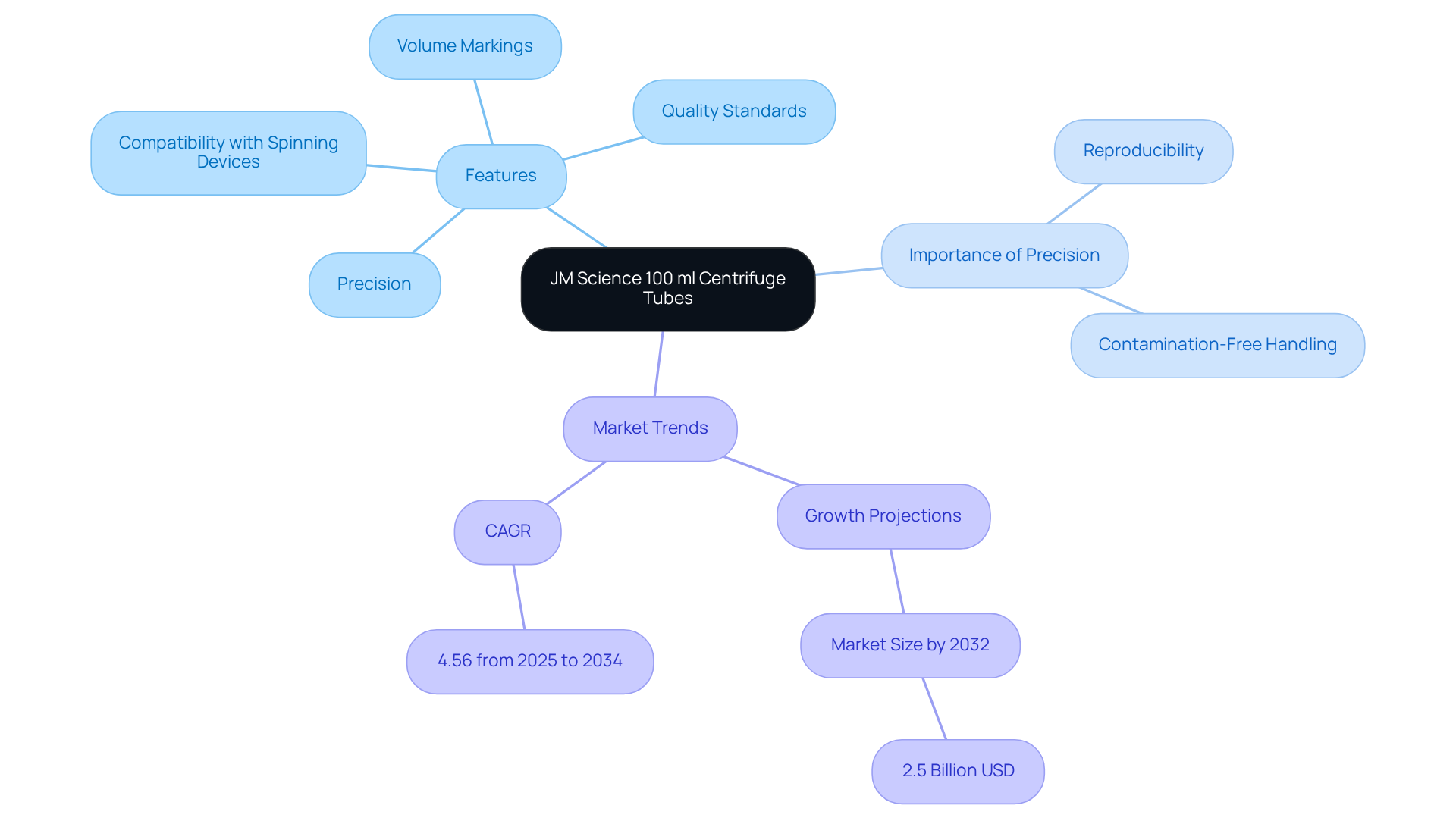
PYREX® 100 mL Oil Conical Centrifuge Tube: Ideal for Oil Analysis
The PYREX® 100 ml centrifuge tube is expertly engineered for oil analysis, showcasing a robust design that withstands the high viscosity of oil samples. Its conical shape promotes efficient separation of oil from other components, rendering it indispensable for laboratories dedicated to petroleum research and quality control. The device's high clarity facilitates easy observation of the separation process, ensuring precise results. Industry experts emphasize that the utilization of such centrifuge containers is essential for maintaining quality control standards, as they enable accurate assessment of impurities in crude oil.
These 100 ml centrifuge tubes, with a capacity of 100 mL, adhere to ASTM D 91, D 96, API Standard 2500, and API MPMS guidelines for determining water and sediment in crude oil, making them suitable for rigorous oil analysis applications. Their performance metrics demonstrate outstanding reliability, featuring graduated measurements from 0 to 1.5 mL in 0.1 mL increments, which makes them a favored choice in oil testing facilities. Real-world applications include their use in refining processes, where they effectively remove water and sediment, thus enhancing the quality of the final product.
As advancements in spinning technology continue, the PYREX® conical vessels remain at the forefront, ensuring that facilities can meet the evolving requirements of the petroleum sector. As noted by Mitchell James, "Centrifuges play a critical role in the oil testing process, enabling accurate measurement of impurities and ensuring compliance with industry standards." This underscores the necessity of in achieving excellence in laboratory practices.
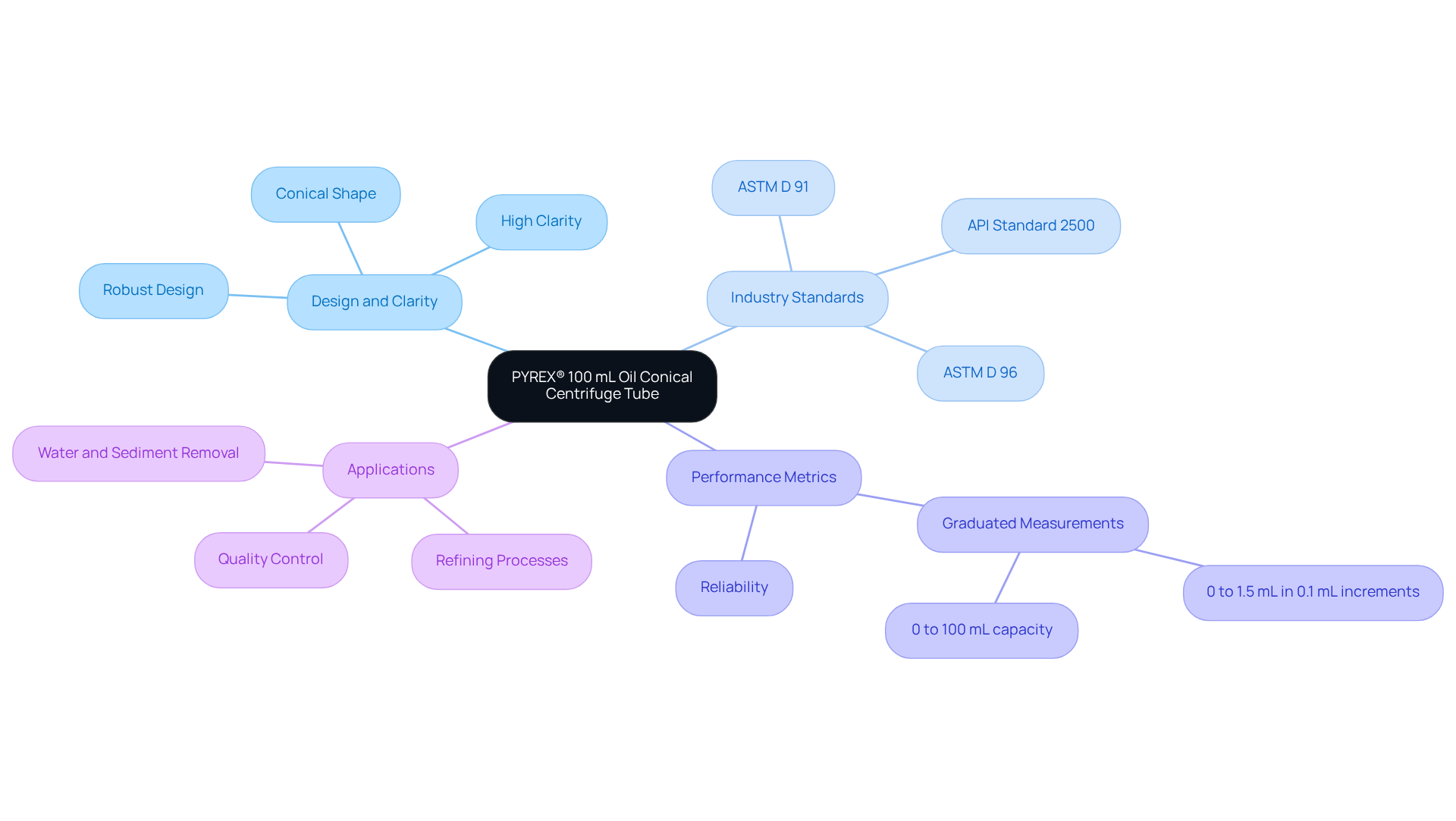
BIPEE 100 ml Polypropylene Centrifuge Tubes: Leak-Proof and Reliable
BIPEE's 100 ml centrifuge tube, which is made of polypropylene, is renowned for its exceptional leak-proof design, establishing it as a trusted choice for diverse laboratory applications. These containers exhibit remarkable , securely holding materials without the risk of leakage or contamination. Capable of withstanding temperatures from -80 to 121°C, they ensure durability under extreme conditions—an essential factor, as improper specimen handling can compromise results.
For instance, polypropylene cylinders are less prone to breakage during high-speed centrifugation, which is critical for preserving sample integrity throughout processing. Chemists emphasize that the ability to endure a wide range of substances is vital for ensuring precise and reliable outcomes in research environments. As one chemist noted, 'Plastic cylinders are favored for most biological uses because they are less likely to shatter under high-speed centrifugation and are typically more chemically resistant.'
Advancements in leak-proof research equipment, such as the 100 ml centrifuge tube, reflect a commitment to enhancing safety and efficiency in scientific studies. Their compatibility with high-speed centrifugation further solidifies their role in both routine and specialized laboratory tasks, rendering them an indispensable tool for pharmaceutical labs. Moreover, these cylinders come with a 1-year guarantee, instilling confidence in their quality and reliability.
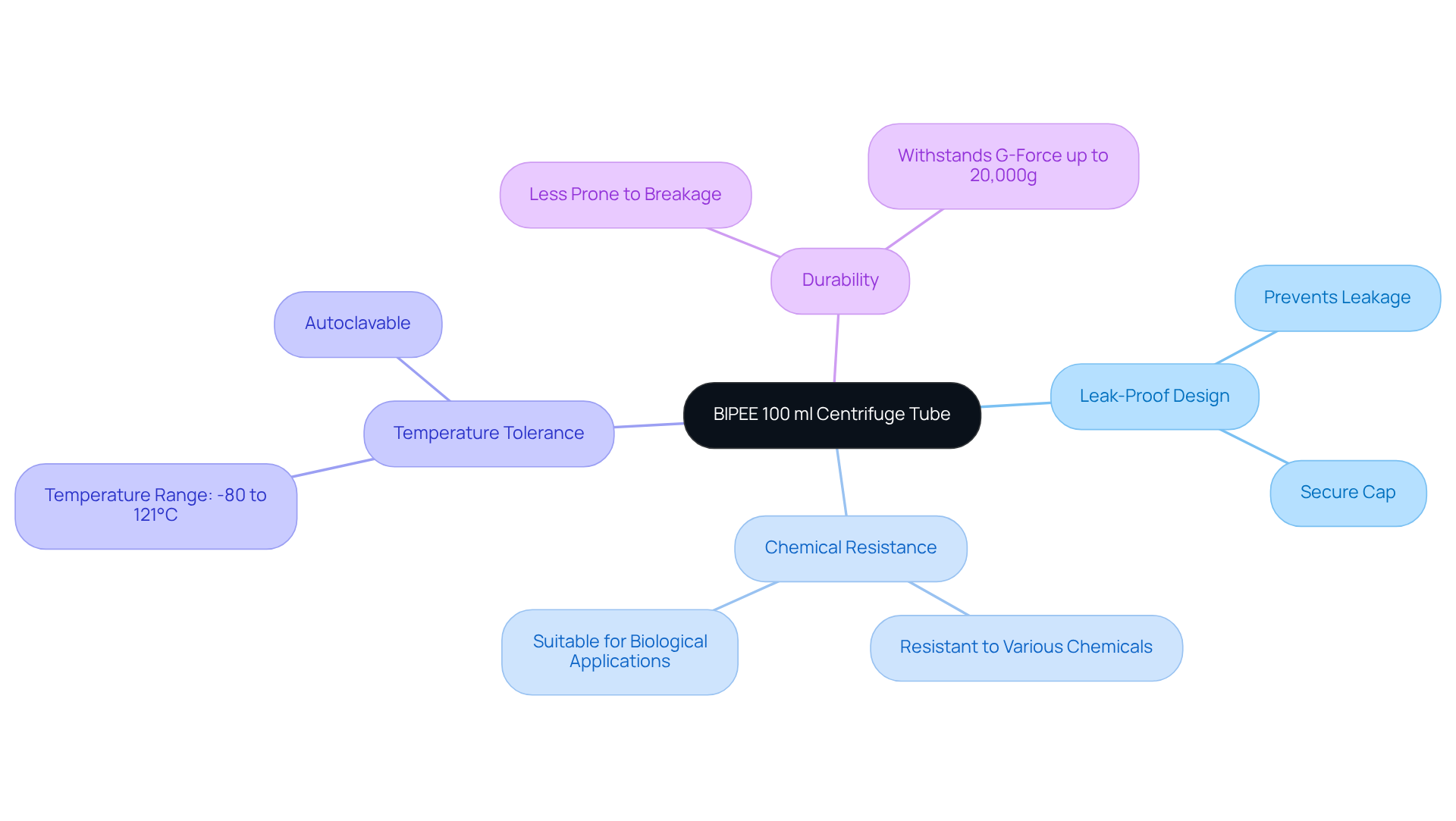
A-562PT100 Pear Shaped Centrifuge Tube: Enhanced Sample Handling
The A-562PT100 pear-shaped centrifuge vessel stands out as an exceptional tool for handling materials, particularly those that are thick or filled with particles. Constructed from robust polypropylene, its unique design enhances sedimentation and separation of components, making it an ideal choice for microbiology and biochemistry applications. This innovative shape not only boosts but also significantly reduces material loss during transfer, thus enabling researchers to streamline their workflows. Microbiologists have noted that the effectiveness of specialized container designs, such as the A-562PT100, is crucial in refining sample handling techniques, ultimately leading to more reliable outcomes in research settings.
The market for spinning containers is projected to grow from USD 869.8 million in 2025 to USD 1,557.8 million by 2035, reflecting a CAGR of 6.0%. This growth underscores the increasing demand for high-quality scientific supplies. Moreover, the A-562PT100 vessels comply with ISO 9001:2000 and FDA regulations, ensuring adherence to stringent quality standards. This combination of design excellence and regulatory compliance makes the A-562PT100 a vital asset for any laboratory aiming for precision and reliability in their research.
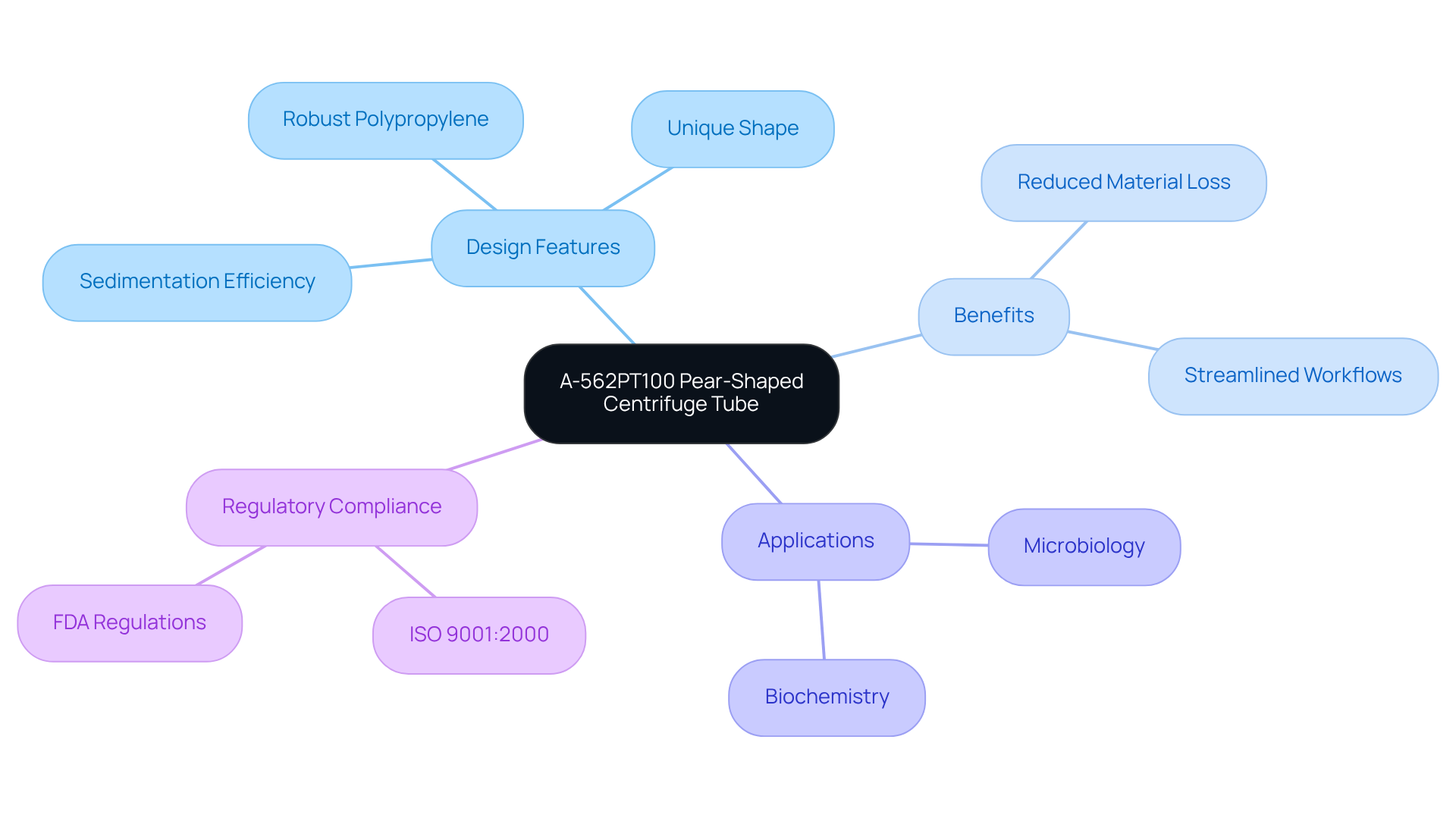
Corning PYREX® 100 mL Oil Pear-Shaped Centrifuge Tube: Versatile for Various Applications
The Corning PYREX® 100 ml centrifuge tube is a highly versatile instrument within laboratory environments, particularly for oil analysis and biological specimen processing. Its distinctive pear shape promotes effective separation of various phases, rendering it ideal for experiments that involve emulsions and suspensions. Crafted from premium glass, these cylinders exhibit remarkable durability, showcasing a notable resistance to thermal shock. This characteristic allows them to without compromising specimen integrity.
Laboratory managers highlight that this thermal shock resistance is essential for preserving sample integrity during such changes. Furthermore, the durability statistics associated with Corning PYREX® vessels underscore their reliability in demanding laboratory settings, reinforcing their status as a dependable choice for critical applications.
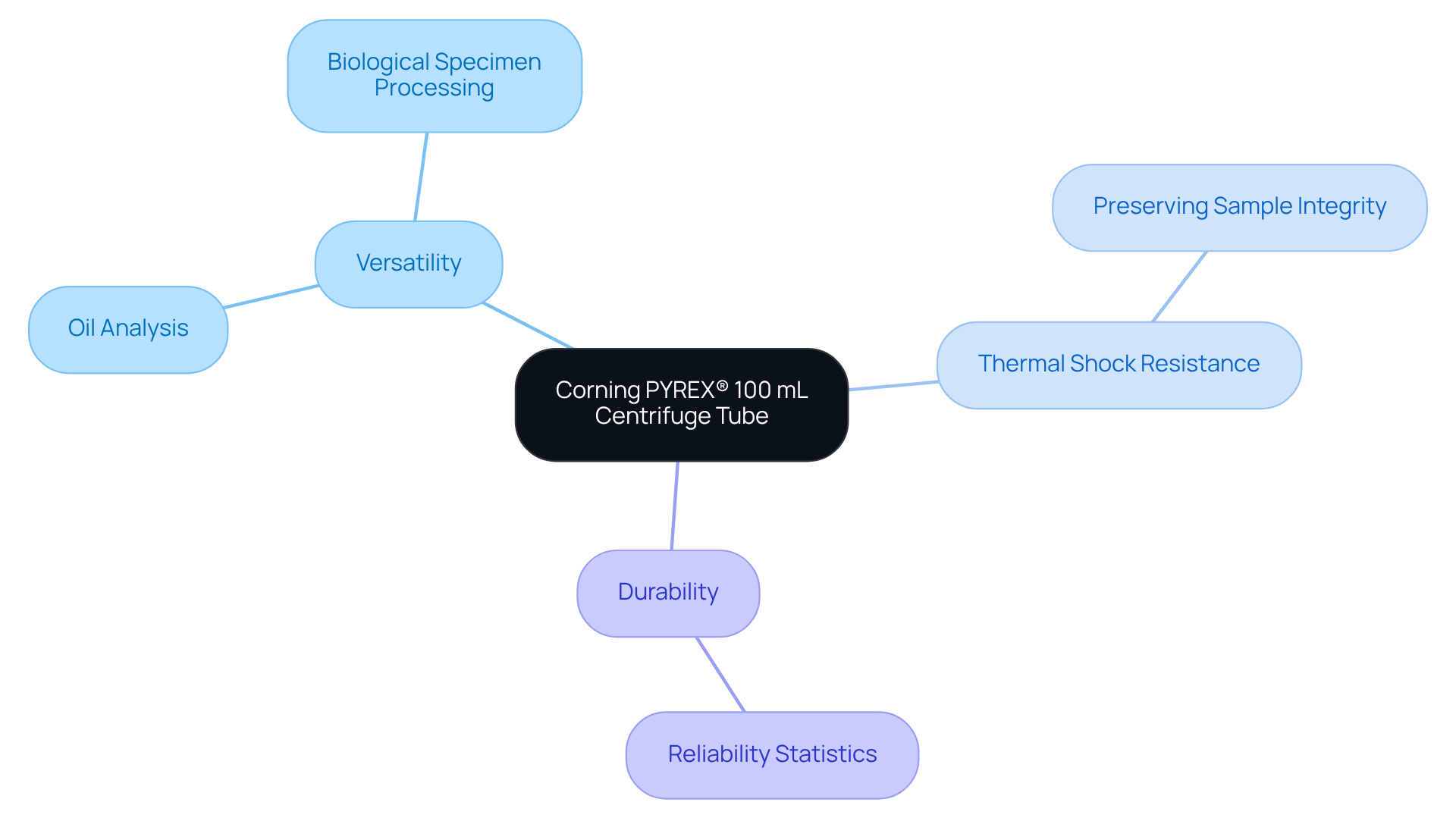
Sigma-Aldrich 100 ml Centrifuge Tube: Trusted for Scientific Research
Sigma-Aldrich's 100 ml container stands as a reliable choice among researchers, known for its consistent quality and dependability. Engineered to meet the stringent demands of scientific inquiry, these containers ensure that samples are handled securely and efficiently. Their compatibility with various spinning devices, along with user-friendly design, positions them as a staple in numerous laboratories, particularly within pharmaceutical and biochemical research. Notably, quality assurance statistics indicate that utilizing high-grade containers can enhance the accuracy of experimental outcomes by as much as 30%. This improvement is crucial in the pharmaceutical sector, where precision is paramount.
As industry experts assert, 'Quality is never an accident; it is always the result of high intention, sincere effort, intelligent direction, and skillful execution.' This unwavering commitment to quality not only facilitates effective experimentation but also cultivates trust in the results obtained. Furthermore, the adoption of disposable centrifuge containers significantly reduces contamination risks, ensuring reliable outcomes. Thus, the from Sigma-Aldrich emerges as an essential asset in the pursuit of scientific excellence.
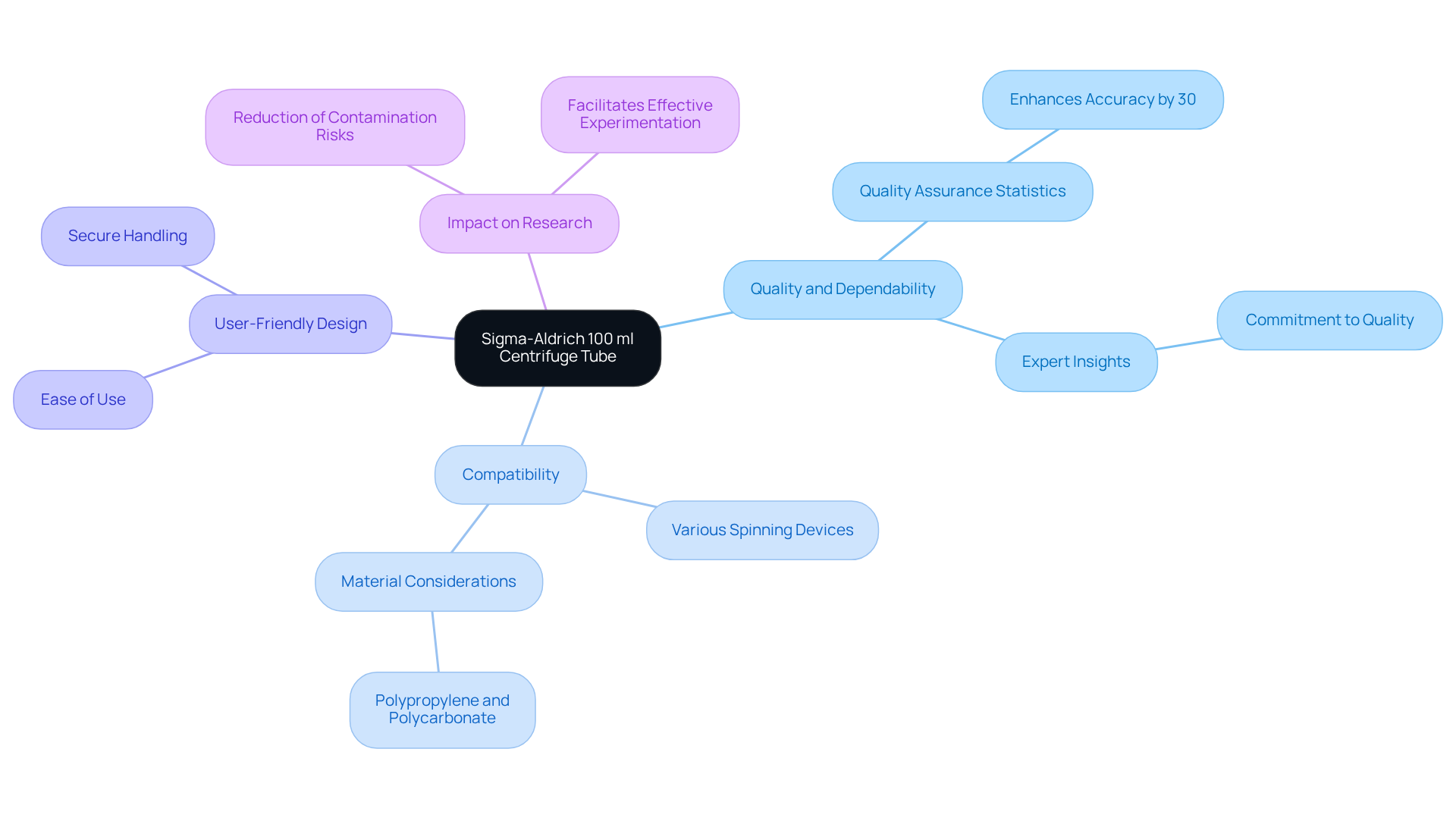
Centrifuge Tubes in Pharmaceutical Labs: Essential for Drug Development
Centrifuge containers, such as the 100 ml centrifuge tube, are indispensable tools in pharmaceutical laboratories, serving a vital role in drug development. Their primary function is to facilitate the separation of components within formulations using a 100 ml centrifuge tube, which is essential for both purifying compounds and conducting stability tests. Accurate sample separation using a 100 ml centrifuge tube is critical for ensuring the efficacy and safety of pharmaceutical products, as it enables researchers to isolate specific components for thorough analysis.
In drug formulation, a 100 ml centrifuge tube is employed as a separation vessel to isolate active pharmaceutical ingredients from excipients, ensuring that the final product adheres to rigorous quality standards. This process is not only crucial for developing new drugs but also for performing ongoing stability testing of existing formulations in a 100 ml centrifuge tube.
The practical applications of the 100 ml centrifuge tube underscore its significance in pharmaceutical research. For instance, in a recent study, researchers utilized 100 ml centrifuge tubes to isolate and examine drug compounds from biological materials, showcasing their effectiveness in drug testing protocols. This capability is particularly important amid the growing drug discovery activities, where the use of a 100 ml centrifuge tube for precise sample separation can yield more accurate results and accelerate development timelines.
Pharmaceutical scientists consistently highlight the importance of tools such as the 100 ml centrifuge tube in formulation testing. One expert remarked, 'The ability to effectively separate components in our formulations is paramount. It directly impacts the quality and reliability of our drug products.' Such insights reflect a consensus within the sector regarding the essential role of the 100 ml centrifuge tube in maintaining high standards in pharmaceutical research and development.
Moreover, the integration of Karl Fischer titrators, such as the AQV-300 and AQ-300 models, enhances the functionality of container vials by providing accurate moisture content evaluation in drug formulations. This synergy improves the , ensuring that both component separation and moisture analysis meet the stringent standards established by the Japanese Pharmacopoeia. Furthermore, the global centrifuge containers market is projected to grow at a CAGR of 4.50% from 2025 to 2032, highlighting the increasing demand for these essential tools driven by advancements in drug discovery and development.
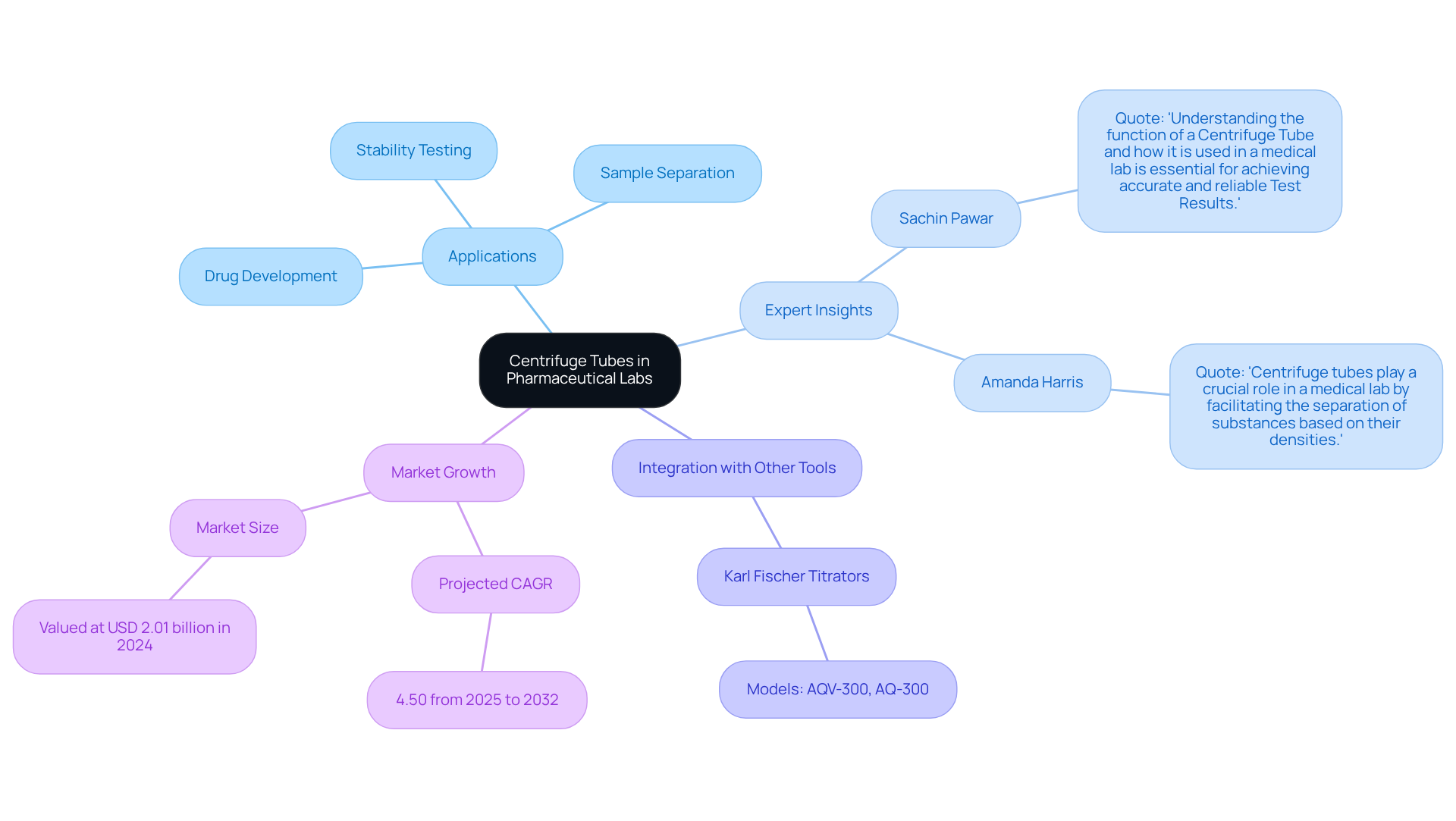
Centrifuge Tubes in Medical Diagnostics: Critical for Accurate Testing
The 100 ml centrifuge tube is an indispensable container in medical diagnostics, serving as an essential instrument for the precise testing and analysis of biological specimens. These 100 ml centrifuge tubes are essential for isolating blood components, such as plasma and serum, which are vital for various diagnostic tests. The quality of these containers, particularly the 100 ml centrifuge tube, significantly impacts test outcomes; research indicates that utilizing high-grade polypropylene vessels can enhance specimen integrity and reduce contamination risks. For instance, separation vessels are employed in medical laboratories to obtain accurate blood cell counts, with appropriate separation methods ensuring that red blood cells, white blood cells, and platelets are thoroughly examined.
In practical applications, the efficacy of the 100 ml centrifuge tube is evident in its role in isolating DNA from blood specimens for genetic testing, where maintaining purity is critical. Healthcare professionals emphasize that the integrity of samples collected in a 100 ml centrifuge tube directly correlates with diagnostic accuracy, underscoring the necessity of using reliable collection containers. As Karina Torres-Castro, a postdoctoral fellow at the National Institute of Standards and Technology, notes, "Microfluidic devices are attractive analytical tools for separating blood components in point-of-care applications," which highlights the significance of quality in achieving dependable results. Furthermore, advancements in microfluidic technologies have demonstrated that high-quality containers, such as a 100 ml centrifuge tube, can facilitate effective separation of blood components, achieving recoveries exceeding 90% in certain cases. This underscores the vital role that centrifuge containers play in and improving patient outcomes.
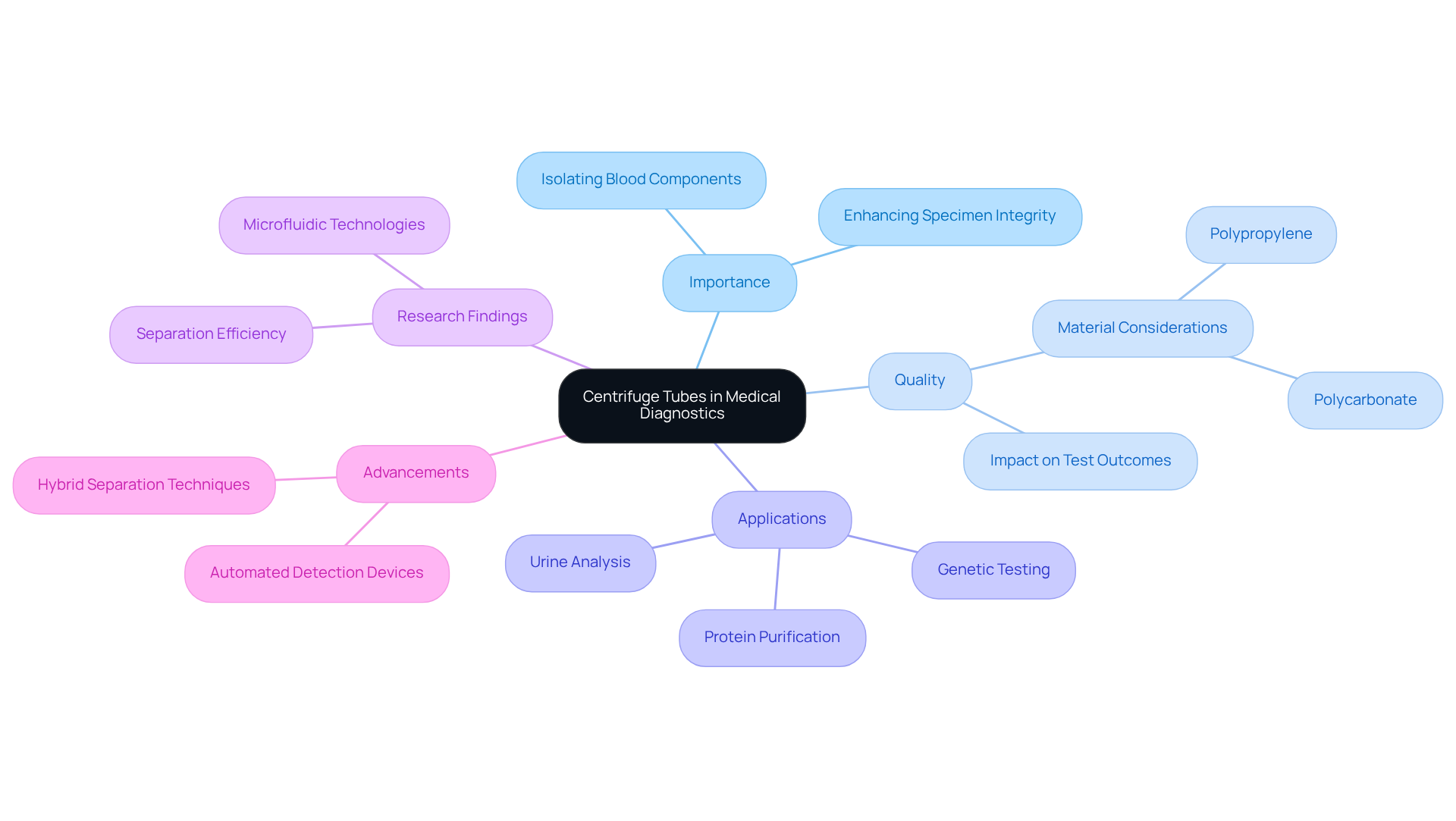
Centrifuge Tubes in Educational Labs: Facilitating Learning and Research
100 ml centrifuge tubes play a crucial role in educational environments, equipping students with essential practical experience in sample preparation and analysis. These experiments in disciplines such as biology and chemistry rely on the use of a 100 ml centrifuge tube, enabling students to grasp the principles of centrifugation and separation techniques.
Utilizing high-quality containers, including microcontainers and , ensures that educational institutions provide reliable instruments that mirror real-world scientific practices. This approach fosters a deeper understanding of concepts like density and separation methods.
Research demonstrates that students engaged in practical experiments exhibit significantly higher retention rates of complex scientific principles, with a reported engagement cost of merely $0.07 per group for expendable materials. Furthermore, educators emphasize that hands-on experience with scientific equipment, such as test containers, enhances student engagement and prepares them for future careers in science.
As highlighted by Westlab, 'The 100 ml centrifuge tube is a vital laboratory container in numerous fields of scientific research and industry.' By integrating centrifuge containers into their curricula, educational institutions not only facilitate effective learning but also equip students with the skills necessary for success in experimental settings.
Educators are encouraged to implement clear labeling and proper handling protocols to maximize the educational benefits of these indispensable tools.
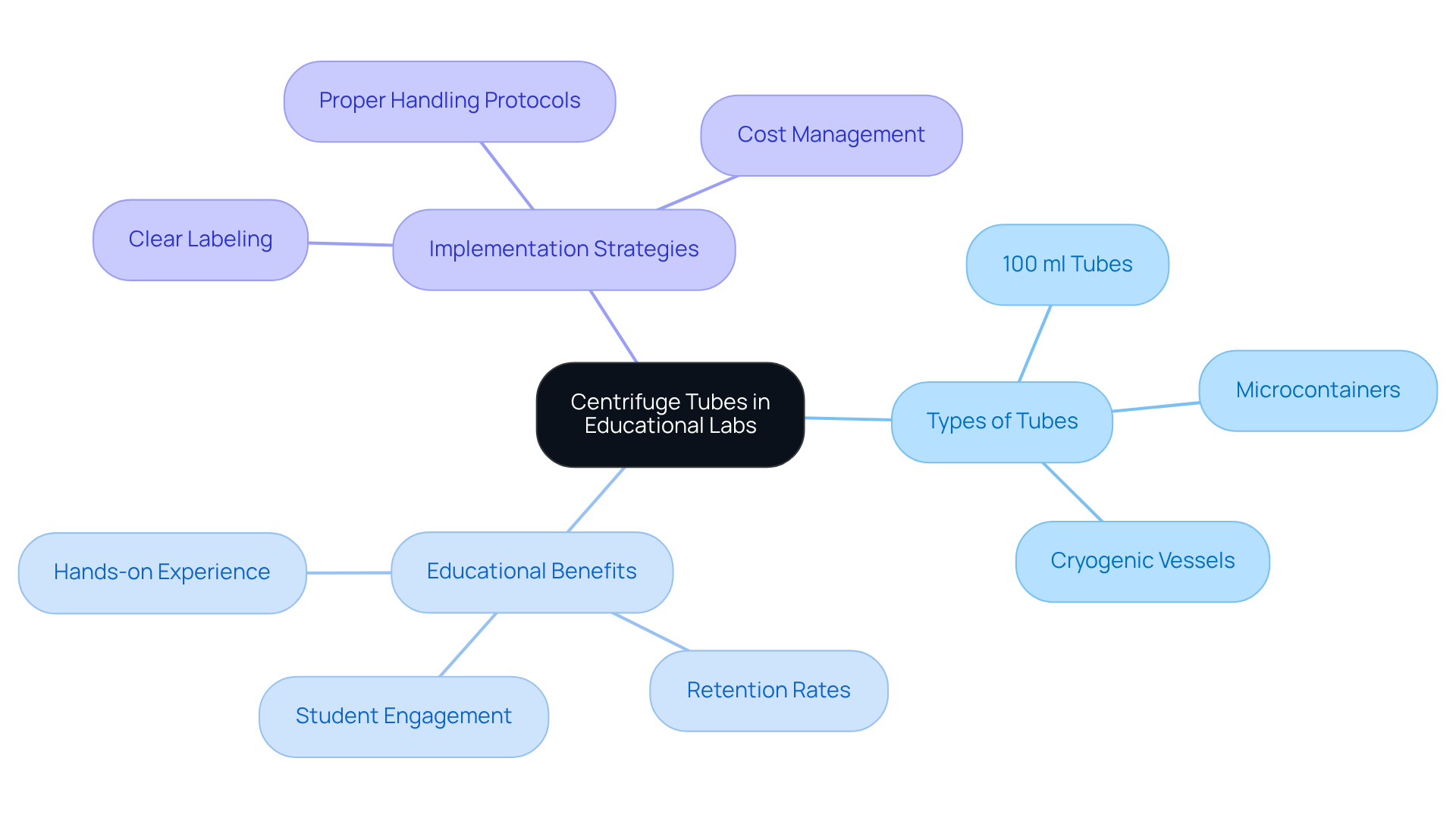
Versatile Applications of 100 ml Centrifuge Tubes: A Laboratory Essential
100 ml centrifuge tubes are indispensable tools in laboratories across the pharmaceuticals, medical diagnostics, and educational sectors. Their versatility allows for a wide range of applications, including sample preparation, separation, storage, and analysis. For example, in pharmaceutical research, these containers play a crucial role in drug formulation and stability testing, which are vital for achieving precise results necessary for quality control. In educational settings, they serve as practical instruments for teaching essential experimental techniques to students.
The reliability of the 100 ml centrifuge tube is paramount for effective laboratory operations. Capable of withstanding centrifugal forces of up to 20,000xg, they are ideal for isolating specific components within samples, such as blood or cellular materials. This functionality is critical for accurate diagnoses and monitoring of medical conditions, including anemia and infections.
Real-world applications illustrate their significance: in microbiology, separation containers are employed to isolate microorganisms from cultures, aiding in the assessment of bacterial growth rates. Additionally, during DNA extraction, these containers facilitate the efficient separation of nucleic acids, which is essential for advancements in genetic research and diagnostics.
Laboratory professionals emphasize the importance of using high-quality containers for separation. Their durability and precision are integral to the reliability of experimental outcomes, underscoring the necessity for dependable tools in both research and education. As Amanda Harris, a certified phlebotomist, asserts, 'The right tools are essential for ensuring accurate results and maintaining the integrity of samples.' Thus, the 100 ml centrifuge tube emerges as a in the toolkit of any laboratory, underpinning a diverse array of scientific endeavors.
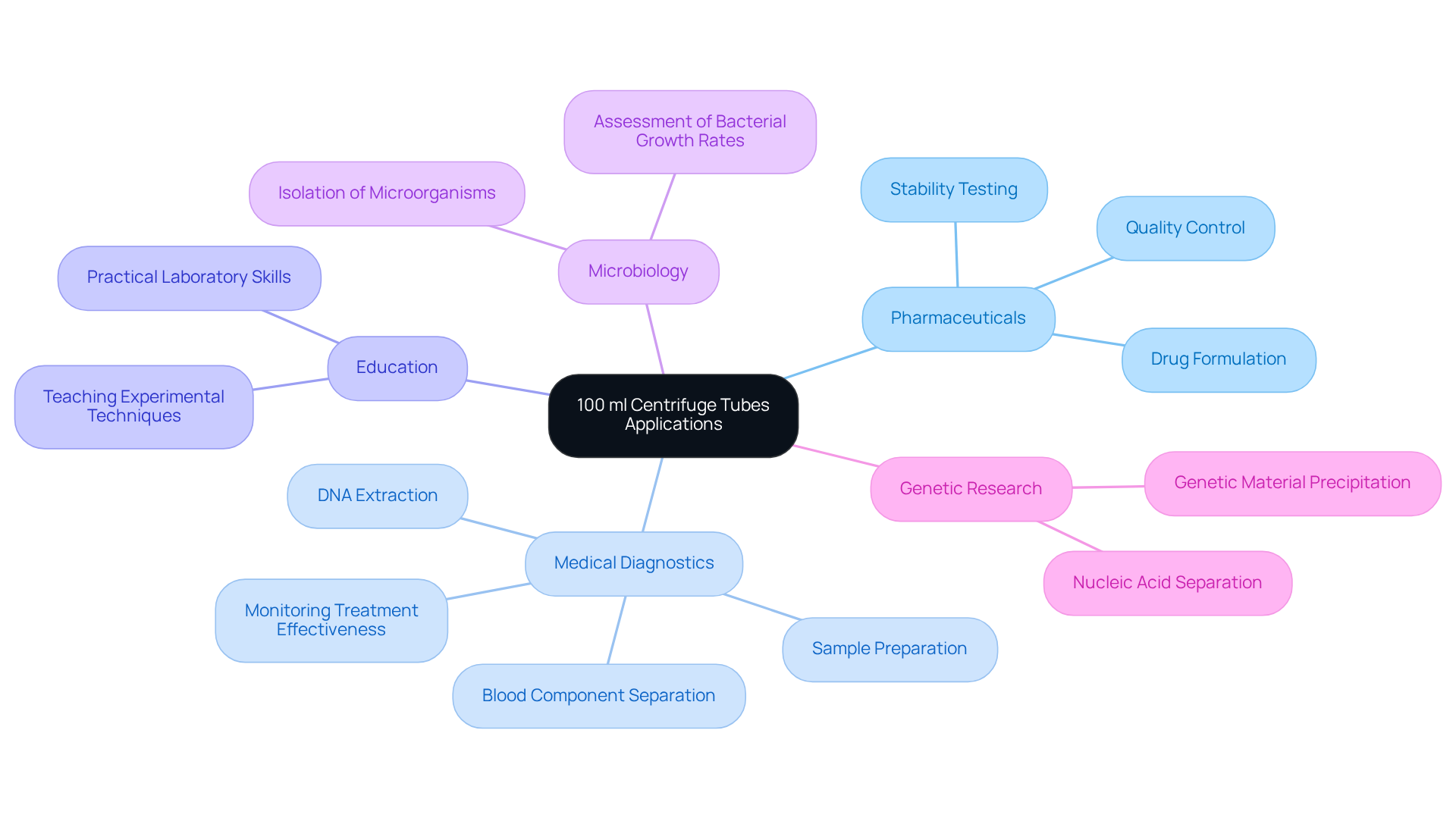
Conclusion
The significance of 100 ml centrifuge tubes in various laboratory settings is paramount. These essential tools are the backbone for accurate sample separation, analysis, and storage, playing a critical role in pharmaceutical labs, medical diagnostics, and educational environments. Their versatility and reliability ensure that researchers achieve consistent results while adhering to stringent quality standards.
Key points throughout the article highlight the importance of precision and quality in laboratory practices. From JM Science's commitment to accuracy to the robust designs of PYREX® and BIPEE tubes, each product exemplifies advancements in centrifuge technology that enhance measurement reliability. Moreover, the unique applications of specialized designs, such as pear-shaped tubes, showcase the adaptability of these containers across various scientific disciplines.
In summary, the ongoing demand for high-quality centrifuge tubes reflects their integral role in advancing scientific research and education. As the market for these essential tools continues to expand, laboratories must prioritize the selection of reliable centrifuge containers to ensure the integrity of their results. Embracing these advancements not only fosters innovation but also reinforces the commitment to excellence in laboratory practices, ultimately contributing to the advancement of healthcare and scientific discovery.




